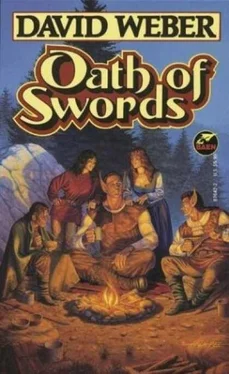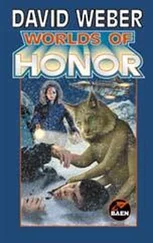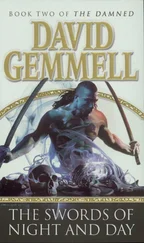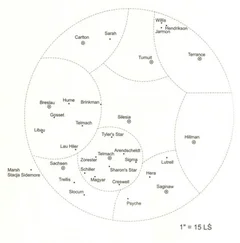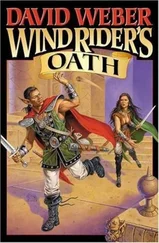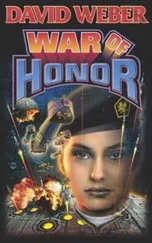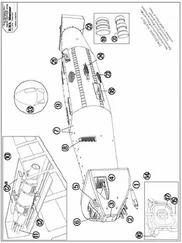“As to that, I’ve no way to know. How could I?” Bahzell shot back. “But is it only a man’s value makes him worth helping? Tothas may be less iron-pated than I, but that’s not making him one bit less worthy!”
“No, it doesn’t, but Tothas never asked me for healing.” Bahzell blinked in fresh disbelief, and the god cocked his head. “There would have been little I could have done for him if he had asked,” he admitted, “just as I can’t crook my finger and put Zarantha safe home in her bed. I’ve already explained why I dare not meddle directly, and it would have taken direct intervention to save Tothas from the dog brothers’ original attack. Nor, for the same reasons, can I make the attack as if it never happened. No god-Light or Dark-dares change the past. You can have no idea of all the possible consequences if we once started doing that, but a little thought should suggest at least some of them to you.”
He held Bahzell’s eyes until the hradani was forced to nod once more, then went on.
“By the same token, Tothas is an excellent example-a small one, perhaps, on the scale of universes, but nonetheless worthy-of how mortals can accomplish things even gods cannot. Zarantha’s done all mortal healing can do for him. Without the healing talent, not even she could have saved him; as it is, you and she between you did just that. She arrested the poison and began his healing; when you compelled him to remain in Dunsahnta, you gave him the time and rest he needs to complete his recovery. But all Tothas ever asked me for were the very things you yourself told him he already had: the heart and courage to endure what he must to fulfill his sworn word to his lady.”
“But you should have done more than that, whether he asked or no!” Bahzell cried, shaken by a sudden, terrible anger, and Tomanāk sighed.
“I should have, and had he encountered one of my champions, perhaps I could have. I can heal, through my priests or champions. Those are my swords in the mortal world, but my priesthood is smaller than most, Bahzell, and I give you fair warning-few of my champions die in bed. I can strengthen and aid them, but they’re made for the shock of battle, and warriors fall in battle.”
“So that’s what you’re wanting of me,” Bahzell said bitterly. “You’re after making me one of your ‘champions.’ Would Tothas have been my price, then? His healing for my service?”
“No,” Tomanāk said more sternly than ever. “Had you been my champion, then, yes, you might have healed him, but I buy no man’s service! If you would follow me, then follow me because you believe it’s right , not for what it can buy you or others. The Dark Gods bribe and corrupt; the only reward I offer is the knowledge that you’ve chosen to do what you believed to be right!”
The anger in that boulder-crushing voice could have annihilated Bahzell on the spot, yet it wasn’t directed at him. It seemed to split and flow about him, and he stood unshaken in the eye of the hurricane until the final echoes rumbled into silence.
“Then just what is it you’re offering me?” he asked finally. “If it’s so all-fired wonderful I am, where’s the need to recruit me for what I’d do of my own stubbornness?”
“I’m trying to offer you my help!” Tomanāk said with pronounced asperity. “I can’t interfere directly in mortal affairs, but I can strengthen and aid mortals against the Dark Gods’ servants . . . if they’ll let me! Your head may be solid stone, Bahzell, but even you must realize by now that you’re as made for battle as a sword-and that you’ve no stomach for fighting on the wrong side! By my Mace, just what do you think you’re doing out here chasing twenty-odd men and a pair of wizards?!” He glared down, eyes flashing like bare swords in the dawn, and his voice shook the clouds. “Well, if you want to fight on the right side, do it under my banner. I’ll show you foes worthy of all the steel in you, and give you a keener edge than you ever knew you could have.”
“Humpf.” Bahzell lowered his gaze from the god’s flashing eyes and chewed his lip. He sensed the power in that plea, and deep inside he knew how much more compelling it could have been. That Tomanāk truly sought to convince, not to command or usurp his will. But too much had come at him too quickly this night. He knew himself too well to believe he had the makings of some god-chosen champion, and all of a hradani’s bone-deep distrust for the promises of those who would use them questioned every word the god had said. That elemental core of stubbornness dug in its heels and hunched its head obstinately against the force of Tomanāk’s appeal, and, at last, he shook his head.
“No.” It took more strength than he’d ever suspected he had to get the word out, but he raised his eyes once more to the god’s face. “I’m not saying you’d lie to me, but it’s in my mind that I can’t know that. And even if I knew every word was true, it’s not a thing for a man to be saying aye or nay to all in one night.” Tomanāk said nothing, and Bahzell raised his right hand, palm cupped as if to hold something.
“It’s not much the world’s left my people, but this much we have; when we give our word, it means something, so I’ll not swear any oath before I’m sure in my own mind of what I’m doing.”
“Of course not,” Tomanāk said quietly. “Nor would I ask you to. I ask only that you keep an open mind-that you do think about it before you say no.”
“And you’ll not plague my dreams in the meantime?” Bahzell demanded.
“No, I won’t ‘plague your dreams,’ ” Tomanāk promised with a smile.
“Well, then.” Bahzell looked up at the towering War God and nodded briskly, and Tomanāk’s smile grew even broader.
“Such a cavalier dismissal,” he murmured, and, for the third time, his laugh shook the earth beneath Bahzell’s feet. Then he faded from view-slowly, not with the suddenness of his sister’s departure in the cave-and his deep voice spoke silently in the back of Bahzell’s brain.
“Very well, I’ll go, Bahzell. But I’ll be back,” it said.
Incense drifted once more about Crown Prince Harnak, and he forced himself not to pace. It was hard. Harnak was always nervous when High Priest Tharnatus summoned him; even the Scorpion’s messengers could stumble and betray themselves-or Harnak. But this summons had been no less curt for the polite formulae in which it was couched, and the prince gnawed his lower lip with his remaining teeth while he waited.
A foot sounded behind him, and he turned quickly from the altar. He flushed at the evidence of his anxiety, but Tharnatus smiled.
“I thank you for coming so promptly, My Prince, especially on so bitter a night.”
Harnak simply nodded, though “bitter” was a weak word for the night beyond the temple. The snow had been belly-deep on his horse, and he’d passed two drifts high as a mounted man’s head. Only Tharnatus could have gotten him out on such a night, and the thought of how the priest must relish the power to do just that touched him with resentment.
Tharnatus’ eyes gleamed as if he’d read the prince’s thoughts, but he only waved for Harnak to sit in one of the front pews and folded his own hands in the sleeves of his robe as he faced him.
“I would not have requested your presence, My Prince, had the matter been less than urgent. I understand things remain . . . difficult at court?”
“You understand aright.” Harnak didn’t-quite-snarl, and Tharnatus smiled gently. “Those bitches are practically members of Bahnak’s own family by now, and he’s using the damned bards to keep the tale alive.” Harnak’s molars ground together. “Even my brothers have taken to laughing behind my back, curse them, and the winter only makes it worse! With so much time indoors and nothing to do but drink and listen to tales-”
Читать дальше
